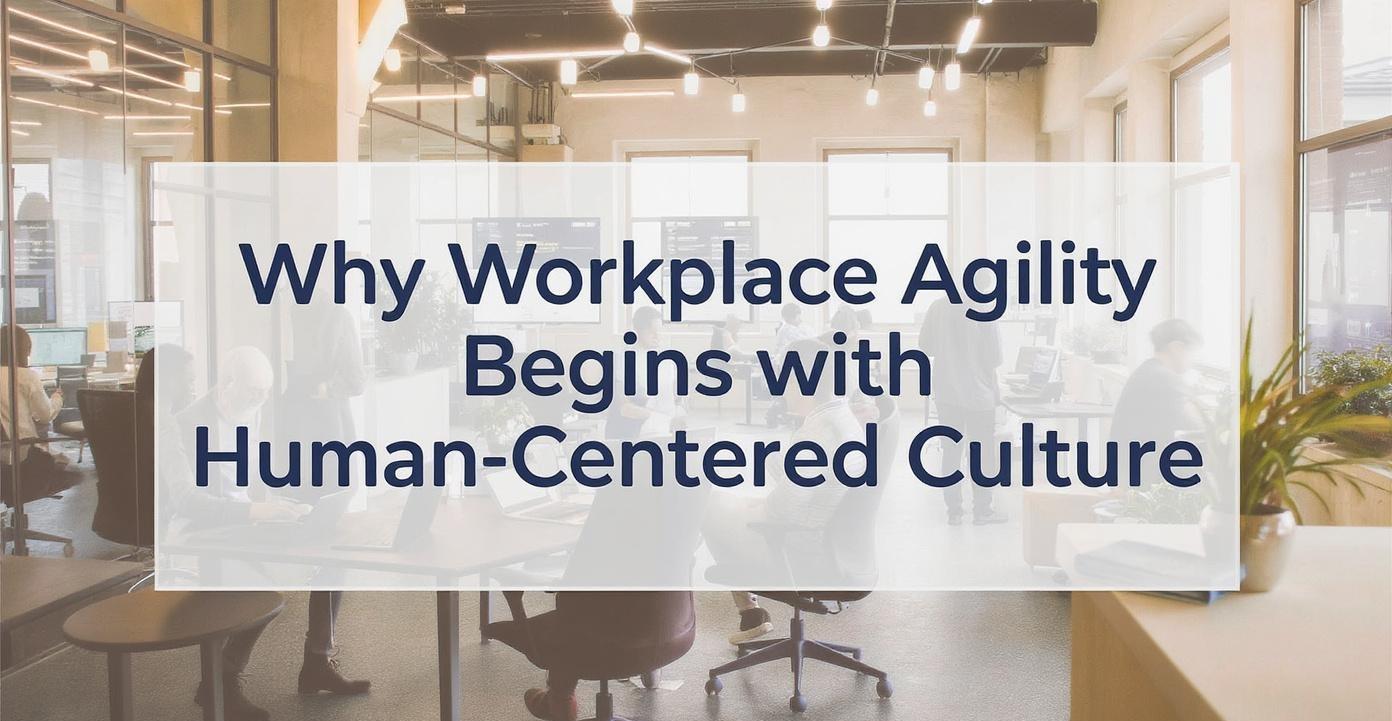How Human-Centered Culture Drives Workplace Agility

In a business world defined by rapid change and uncertainty, organizations must be agile to remain competitive. However, true agility goes beyond adopting frameworks, tools, or methodologies—it begins with creating a Human-Centered Culture that places employees at the core. When people feel valued, supported, and aligned with organizational goals, they are better equipped to respond to change, collaborate effectively, and innovate continuously.
Defining a Human-Centered Culture
A Human-Centered Culture recognizes that employees are individuals with unique strengths, perspectives, and aspirations. This culture prioritizes empathy, trust, and inclusivity, fostering an environment where teams feel psychologically safe. In such workplaces, employees are empowered to experiment, share ideas, and contribute to organizational growth. This foundation is essential for agility to flourish in any organization.
Empathetic Leadership Builds Agile Teams
Leadership plays a critical role in embedding agility through a human-centered approach. Leaders who actively listen, provide clear guidance, and demonstrate empathy cultivate trust within their teams. By modeling transparency and accountability, leaders encourage employees to take risks, innovate, and adapt to changing conditions without fear of failure. Human-centered leadership drives the resilience and flexibility that agile workplaces require.
Open Communication Encourages Collaboration
Communication is the lifeblood of agile teams. Human-centered organizations implement channels and practices that facilitate continuous dialogue, feedback, and collaboration. Regular team check-ins, feedback surveys, and open forums help leadership understand employee perspectives and respond effectively. Transparent communication ensures that teams remain aligned, engaged, and ready to pivot when necessary.
Prioritizing Employee Well-Being
Agility depends on employees’ mental, emotional, and physical well-being. Human-centered workplaces prioritize wellness by offering flexible work options, mental health resources, and work-life balance initiatives. Employees who feel supported are more engaged, creative, and capable of adapting to change. By addressing burnout and promoting well-being, organizations strengthen team performance and agility.
Diversity and Inclusion Drive Agility
A diverse and inclusive workforce enhances organizational adaptability. Human-centered workplaces actively seek varied perspectives and experiences, encouraging collaboration and creative problem-solving. Inclusion fosters belonging and trust, enabling teams to respond quickly to challenges and explore innovative solutions. Agile organizations leverage diversity to generate ideas that drive sustained growth and competitiveness.
Technology as an Enabler, Not a Replacement
While technology is critical for streamlining processes, it cannot replace the human connections that foster agility. Human-centered organizations use technology to enhance collaboration, communication, and learning. Tools for project management, virtual collaboration, and feedback should support human interaction rather than replace it. This approach ensures teams remain connected and responsive to evolving demands.
Aligning Employee Goals with Organizational Vision
Employees perform best when their personal goals align with organizational purpose. Human-centered workplaces clarify the connection between individual contributions and broader objectives, fostering engagement and ownership. Purpose-driven employees are more likely to embrace change, innovate, and support agile processes, creating a stronger, more resilient workforce.
Continuous Learning and Development
Agility requires employees to evolve constantly. Human-centered organizations invest in continuous learning through training, mentoring, and cross-functional projects. By providing opportunities to develop new skills, organizations empower employees to meet emerging challenges confidently. A learning-focused culture ensures teams remain adaptable, capable, and innovative.
Feedback Loops for Growth and Adaptation
In human-centered workplaces, feedback is an ongoing process, not a one-time event. Agile teams benefit from continuous feedback that promotes learning, adaptation, and improvement. Safe, constructive feedback loops foster trust and collaboration, enabling teams to pivot quickly and respond effectively to organizational and market changes.
Attracting and Retaining Top Talent
Workplace agility is strengthened by the ability to attract and retain skilled, motivated employees. Human-centered organizations provide supportive, inclusive, and purpose-driven environments that appeal to top talent. Employees who feel valued and empowered are more likely to remain committed, helping maintain high-performing and adaptable teams.
Experimentation and Innovation in Agile Workplaces
Agile organizations encourage experimentation and iterative improvement. Human-centered workplaces foster a mindset where employees are free to test new approaches, learn from mistakes, and iterate continuously. This culture of experimentation ensures that teams remain innovative, resilient, and able to navigate complex business challenges.
Trust as the Core of Agility
Trust is the foundation of any agile workplace. Human-centered organizations build trust through transparency, consistency, and empathy. When employees feel trusted by leaders and colleagues, they are more willing to share ideas, collaborate openly, and embrace change. This trust enables agile teams to function efficiently and respond to challenges with confidence.
Empowering Teams Through Human-Centered Agility
Ultimately, workplace agility thrives when organizations prioritize people. By fostering a Human-Centered Culture, companies empower employees to adapt, innovate, and collaborate effectively. This approach builds resilient teams capable of navigating uncertainty and driving sustainable organizational success.
Read Full Article : https://bizinfopro.com/blogs/hr-blogs/why-workplace-agility-begins-with-human-centered-culture/
About Us : BizInfoPro is a modern business publication designed to inform, inspire, and empower decision-makers, entrepreneurs, and forward-thinking professionals. With a focus on practical insights and in‑depth analysis, it explores the evolving landscape of global business—covering emerging markets, industry innovations, strategic growth opportunities, and actionable content that supports smarter decision‑making.
- Art
- Causes
- Crafts
- Dance
- Drinks
- Film
- Fitness
- Food
- Jocuri
- Gardening
- Health
- Home
- Literature
- Music
- Networking
- Alte
- Party
- Religion
- Shopping
- Sports
- Theater
- Wellness




